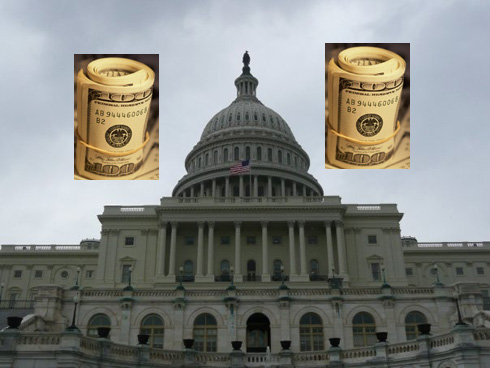In the wake of Thursday’s Supreme Court ruling on money in politics, corporations looking to affect the process already are strategizing with lawyers, consultants, and PR pros on how to capitalize on the changed landscape.
“There clearly are clients who are asking questions about what it means for them,” Larry Noble, a former general counsel for the FEC who’s now a lawyer at Skadden Arps, told TPMmuckraker. “They’re asking: ‘what is it that I wasn’t allowed to do before that I can now do?'”
In a nutshell, of course, last week’s ruling allows corporations to spend unlimited amounts from their general treasuries on independent expenditure campaigns that explicitly advocate the election or defeat of a candidate. Indeed, Noble said that many of the clients looking to take advantage of the ruling are those who had previously run issue-based political ads, as the law had allowed. Now, though, they’re exploring the idea of running ads that directly tell voters to elect, or defeat, a candidate. “They’re starting to incorporate this into what they’re doing,” he said.
Tom Walls, a partner at the Washington law firm McGuireWoods LLP* said his clients were “still digesting” the ruling, but he added that he’s already advising some of them on the potential implications. “We’re assessing what this means in practical terms ,” Walls said. The immediate upshot? “It perhaps provides them an opportunity to be heard more directly.”
Rich Masterson, a Republican political consultant whose firm, CampaignGrid, develops internet ad campaigns, said his phone had been ringing off the hook with potential clients whose eagerness to develop campaigns for the 2010 election was given a major boost by Thursday’s ruling. Many of these corporate players can now “accelerate their planning,” he said, describing the mood as “cautiously optimistic.” That’s especially true of corporations in heavily regulated industries — the financial sector, for instance — who have a lot to gain or lose from what happens in Washington.
Masterson also suggested that impact of the ruling could be as significant for campaign fundraising as for communication with voters. In recent days, most predictions about the the effect of the court’s decision have focused on corporations’ new ability to run — or threaten to run — negative TV ads against candidates they oppose. But in a white paper being prepared by CampaignGrid — a draft of which was provided to TPMmuckraker — the firm notes that the ruling may have “profound implications for online advertising,” in part by making it easier for corporations to use the internet to help candidates raise money.
The paper gives an example of how that would work:
Using a combination of display and search advertising, FSC Bank could advertise online and link to Congressman Goodfellow’s campaign website to drive traffic and volunteers and donations to the website – however FSC Bank could not report back the results of these efforts to the Goodfellow Campaign.
To be sure, most lobbyists and lawyers aren’t counseling their clients to go full steam ahead into the new frontier just yet. The powerhouse Washington law and lobbying firm K&L Gates put out a “Public Policy and Law Alert” Thursday, advising that “a corporation looking to act with the freedom granted by this decision should proceed cautiously,” since the FEC may still issuing regulations that alter the effect of the court’s ruling. And Congress could act to mitigate some of its effects.
Still, the general effect of the ruling is already starting to become clear. “I think you’re gonna see more money entering the process, in the form of these ads” said Noble of Skadden Arps. “I think we will notice the difference.”
* The name of Walls’s employer has been corrected from an earlier version.









